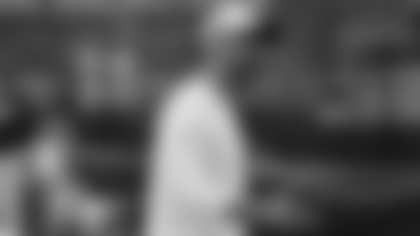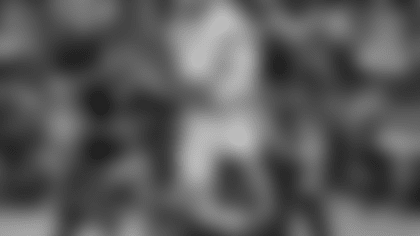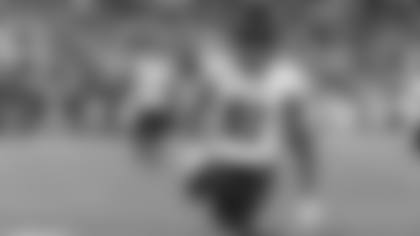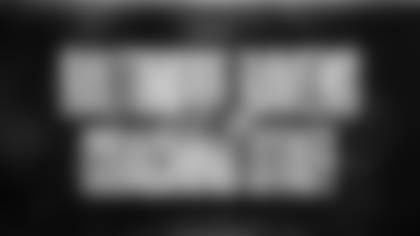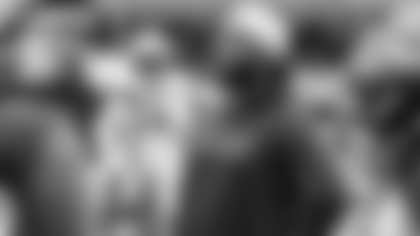PRE-DRAFT MEDIA LUNCHEON PRESS CONFERENCE
This time of year is all about the draft, but Joe Flacco just came out and said he felt he was the best quarterback in the NFL. Is this something the organization likes to hear or would rather have him keep under wraps? (Joe Platania)
(NEWSOME) "I don't think any player, any coach, any team does not think that they aren't the best at what they do. And, for Joe to say that, I think it's a common thing. The aspect of it that I think we also look at is that if you make a statement like that, you also have to prepare yourself to be the best. And, I'm sure that Joe is also doing that."
Whether or not the Ravens have a lot of room with their salary cap, why is it that you are always confident going into the draft? (Barry Barnes)
(NEWSOME) "I think it's the work that the area scouts do during the fall with Eric [DeCosta] and Joe [Hortiz] and George [Kokinis] over the top. And then, [it's] the involvement of the coaches during the spring. We mesh the two, and when it's time for us to get on the clock, I think we're prepared for a bunch of different scenarios and it allows us to proceed, with caution. But I think we are really prepared for any situation."
Has Ray Rice outplayed his contract, like he stated? (Jerry Coleman)
(NEWSOME) "That was a rookie contract, so yes. I would like to think that every player with the Ravens that we draft, hopefully, outplays their first contract. So yes, he has."
Do you think he's due for a significant raise, or are you happy with the way things are right now in terms of the franchise tag? (Jerry Coleman)
(NEWSOME) "We're happy with the progress that we're making with negotiations. But, to say from where he was to where we put the franchise tag on him, that's a significant increase."
You've made a trade in the draft every year since 2001. Can you explain what happens in the draft room when making a trade? Do you think there's a chance you may go up or down with the 29th pick this year? (Dave Ginsburg)
(NEWSOME) "Each year before the draft starts, Eric and Pat [Moriarty] put together the draft scenario, the trade scenario – trading up four or five spots, maybe as much as 10 spots – then, trading back as far as 10 spots. It's already prepared for. We make calls to teams ahead of us and behind us to alert them that we have the potential to move. So, that happens every year. At 29, I think the best way to start off is you have to have 29 players, because you can't control the other 28. So, if you're on the clock and 28 players have been taken, you have to be ready to take that 29th if the phone call doesn't come."
Is there a new trade-up chart given the changes in the rookie pay scale? (Vinny Cerrato)
(NEWSOME) "What Vinny is alluding to, under the old system it was a significant amount of money that was paid to those top 10 picks. That's not the case anymore. Has there been a new chart put out yet? I haven't seen it. And if it will be, then we will be prepared to use it."
Joe Flacco has been a very durable player. As you enter this draft, are you satisfied with your backup quarterback situation? (Stan Charles)
(NEWSOME) "Yes, but I'm going to let coach Harbaugh talk about that one."
(HARBAUGH) "Yes, with Tyrod Taylor, absolutely. But, everybody competes for every spot every year, every practice, and Tyrod is no different. But, we like him a lot."
You talk about trading up or down 10 places. Beyond that, does making a trade become impractical or out of the question? (Peter Schmuck)
(NEWSOME) "If you go beyond that – I don't have the trade chart in front of me – but you start to deal with a first-round pick the following year, and only once have we given that up. We'd do it for a quarterback, and we did it for Kyle [Boller]. But, I think that's why there's a cutoff."
What strength do you see in centers and guards in the first and second rounds of this draft? (Aaron Wilson)
(DECOSTA) "I think there are some good players. Obviously, [David] DeCastro from Stanford is a guy that a lot of teams are looking at as a guard. He's a tough guy, a good player. [Kevin] Zeitler from Wisconsin is another guard – a good player [who] had a good week at the Senior Bowl. [He] played really well in the game, not as well in the practices. He's a good player. I think his teammate [Peter] Konz is another good player at center. He's had some injuries. All those guys, you figure they get picked in the latter half of the first round, the early part of the second round. Another guy is Cordy Glenn from Georgia. He's played some tackle, he's played some guard. He's a swing guy. He's played some left tackle, left guard, right tackle, right guard – has some versatility. He'll probably get picked between pick 50 and pick 35, right in that range, too."
Is the talent deep enough in this draft at the offensive line position that you might not have to trade up to get the best available? (Jason Butt)
(DECOSTA) "I think we have players in every round that we like. One of the things we try to do is ascertain the value, league-wise, and then look at our value, how we value players. And usually, there's a match there for us. At any point in any round we have a couple of players to choose from in any given position, for sure."
You have a good system for the draft that you utilized for 16 years. Has the way you approach scouting changed much over that time with all the information now available? (Nestor Aparicio)
(NEWSOME) "Well, there have been some changes, but not a whole lot. We still don't belong to either National or Blesto [scouting services]. We still have our area scouts responsible for every player that's being drafted in their area. So, a lot of that has not changed. There's a lot more information, but I think there's a lot more misinformation, and our scouts are responsible for getting as good information as they can for us and bringing it back to this group here so that we can make decisions. We would much prefer our scouts talking to strength coaches, secretaries at the school and people like that then living off the Internet."
Do all teams approach it the same way, or are there a lot of different philosophies in other organizations? (Nestor Aparicio)
(NEWSOME) "I really don't know what other people do. There have been people who have left here and went to other organizations, but all I try to do is to get this group to be as good as we can be every year. And, what New England does, what Cleveland, what Cincinnati does, I can't put a whole lot of stock in that."
What do you think of some of the receivers available in this year's draft class? (Aaron Wilson)
(HORTIZ) "A guy like [Stephen] Hill, he obviously showed up at the Combine. Everyone watched it. He's an explosive guy who plays in that triple-option offense and really jumped off the film in terms of vertical speed. He's raw, like a lot of guys are who have come out of that offense, [like] Demaryius Thomas. Their route polish isn't quite there, but his athletic traits are really outstanding and exceptional, rare for the position. It would be a process of him picking up an NFL-style offense, learning how to read defenses. He doesn't have to do a lot of that there. He has to block or run vertical, a limited route tree. [Mohamed]Sanu comes more from a pro-style offense. He certainly has the size. He's not quite as explosive as a Stephen Hill, but he's a guy who can catch a ball really well. He understands how to use his body and get open, work underneath. They are both talented guys, a little bit different types of players. [Rueben] Randall, he's more pro-style. They run a lot of that zone-read, depending on the quarterback, but he's explosive as well. He didn't run as great at the Combine, but he went to his pro day and cleaned up there. He changed his running form, and you could see the difference. He was tight at the Combine, kind of bound up. If you watched him run, he looked more relaxed. He's an explosive guy and he's been a playmaker there at LSU for them."
At the State of the Ravens address, Steve Bisciotti seemed to imply there's more of an emphasis on getting players who can make an immediate impact. Is that accurate in terms of what you are looking for? (Stan Charles)
(NEWSOME) "I think what he was trying to communicate to everyone is what I think and what John and the coaches think, too. We want to have players that before they get to their fourth year, we need to know how good they are so that we can either extend them or not extend them based on our situation. I think that's what he was implying, and that's in line with the way John and I think."
Is there are effort to get more veterans on special teams so younger players can focus on their positions? (Stan Charles)
(HARBAUGH) "There has been more of an effort to get veterans on special teams, but not to get the younger players to focus on their positions. We're trying to bolster our special teams. When you can put some anchors at some positions … Brendon Ayanbadejo is a great example. He anchors the linebacker position a little bit. Those guys have a role model – a guy they can watch at practice, watch him prepare and see how it's done firsthand. It helps younger guys come along quicker in that area. We also think, and I know Ozzie agrees with this, too, and has always believed this, you prepare your guys for their position through special teams. If they get on the field and they play special teams, it gives them a step towards playing their position. A guy like Torrey Smith might pass that up because of need and because of talent, and things like that. But, most of the guys play a role on special teams as they get better at their position."
Have any players come to you to express a desire that the team not draft certain players? (Barry Barnes)
(NEWSOME) "No, not that I can recall. If there is a player on our team and there's a player in the draft who has a relationship with him through their agent, through the community they grew up in or through the college they attended, then we will go to that player and try to get information about the draft-eligible player. But I don't think at any point someone has come in [to discuss that]. In 16 years, Ray Lewis has not come in and told me, 'Don't draft another linebacker,' because he knows that has no bearing on whether I will or not. We have to build a team of 53 men on it. Because we have one good player at a position, that doesn't mean we won't need another one."
What are the priorities you need to address in the draft? (Vinny Cerrato)
(NEWSOME) "I don't think that has changed much from the end of the season. We need to add some players on the offensive line. We can add another receiver. We still feel that we can add some depth at the pass-rush position or at SAM 'backer. I think we have improved our special teams already with Corey [Graham] and with Brendon. [We have improved] with those people and Sean Considine. That was an area [we needed to address]. People talk about offense and defense, but we gave up three special teams touchdowns, and I don't like that. John doesn't like that. So, we're trying to improve that, because that's three scores that changed the way the game was being played when we gave up those touchdowns. We think we've improved in those areas, and we'll take the opportunity between now and the beginning of the season to improve in those other areas."
As the head coach, what areas do you want to see addressed first? (Pete Gilbert)
(HARBAUGH) "They're all there. It depends on who is available, it really does. You try to make yourself as strong as you can. One thing we're not adverse to is becoming stronger at a strong position either. So, if you have an opportunity to add a player or keep a player in a perceived area of strength, it just makes your team stronger; it gives you more options. You always want to collect as many good players as you can to fit your style, and as a coach, you figure out how to play them. If you have a glaring area of need, you want to fill it, but never at the expense of making your team better across the board."
It has been reported that the Ravens don't have a lot of cap room. Do you ever remember being so tight against the cap before the draft or is this a unique situation? (Steve Davis)
(NEWSOME) "No, it's not unique. We've been here four or five other times I can recall. With us, the cap is very fluid. Teams do some things that we try not to do. Steve gives us the talk all the time about what's going to be in '13 and what '14 is going to be like. So, we just don't try to put everything into one year. We did one year – in 2001 – and you saw what happened. We had to just turn the whole team over. But we tried to make the run to win two Super Bowls in a row. I think we learned from that. So, regardless of what the number we are at the cap, the three of us with Dick [Cass] and with Pat, we have a plan. We talked yesterday, two days ago, we talk about the cap, basically, every day. And if there's a good player that can come in and help our football team, we'll be able to fit him under our cap."
With the release of one of the player's Wonderlic scores, what emphasis do teams put on that as opposed to a player's body of work? (Bruce Raffel)
(DECOSTA) "First of all, the tests are supposed to be confidential, and only a few people get those, which is unfortunate that a test would come out, we feel. We do look at the Wonderlic Test. I think, obviously, the body of work that you refer to, the tape, how the guy plays, is the most important thing. In regards to the Wonderlic Test, we treat that like a lot of other things – it's a flag. It could be a concern. It could mean that we have to do more work on a guy, i.e., bring a guy in, spend a day with him here in Baltimore, interview a guy at the Combine, have the coaches spend some time with him, have him watch some football tape, talk to some other people at the school to get some more information. We don't base our decisions on a Wonderlic, just like we don't base our decisions on a 40-yard dash, a vertical jump and, in most cases, on a guy being arrested. We take the whole body of work, we look at it, we compare each player and we make our decisions."
The return game wasn't addressed in that area of needs. Is it still something you still believe to be a priority or is the answer perhaps still on the roster? (Glenn Clark)
(HARBAUGH) "The answer, you've got to consider it always being on the roster, because that's where you're at at any point in given time. But, we're looking. We tried to do something with a free agent or two, and it didn't work out, but that's OK. We'll move on to the next opportunity. We've got some guys on campus right now that have a chance to help us and be pretty good. But by the same token, if there is a great one, we're interested."
Do you have some names, maybe some guys on the short list, in terms of the return game, that are out there in the middle rounds? (Bo Smolka)
(HORTIZ) "No. (laughter) Without tipping our hand, no. There are some good ones out there, I will say that. There are some guys that are impactful guys in college, and there are some guys that maybe haven't done a lot of it but have potential. 'Webby' [Lardarius Webb] didn't do a lot of it in college, and he turned out to be a pretty good punt returner for us thus far. There are guys that can do it that don't do it in college, but there are guys that have the traits to do it and there are guys that are exceptional in college, [Bears RS/WR Devin] Hester. So without telling the names, there are some."
Is it fair to say that you'd like to get Lardarius Webb off that punt team this fall? (Bo Smolka)
(HARBAUGH) "Joe feels like I've said too much already. (laughing) I have no problem with Lardarius returning punts. Although, if there is another option that is a better player or takes your starting corner and takes him off the punt return, that's even better. But, you can't sit there and play scared. So, I don't have a problem with that, per se, but I would rather have a backup doing it, yes."
Sergio Kindle, are you still convinced that he can be the player that you thought he could be when you drafted him and when you first saw him? (Stan Charles)
(NEWSOME) "I'll say this and then I'll let John [answer]: We'll have him here starting on April 16. We'll have a full offseason. I think we know what some of the issues are, and we will attack those issues. It'll be interesting to see."
(HARBAUGH) "In all fairness, it's probably unprecedented what he has had to face [with] that kind of an injury. He's really unusual. Like our doctors tell us all the time, we're treading in unknown territory. But, he's made great progress. The year of practice really helped him. He's going to get every opportunity, and we're going to coach him like crazy, and we're going to make it our mission to get him on the field and get him playing, because he has talent and he wants to do well."
The hearing issues that came about from the fall, are those a real detriment to him reaching his potential? (Stan Charles)
(NEWSOME) "Huh? (laughter) Next question."
You've always talked about the formula, and I know that's important to you picking the best guy available. The last three [high-round] picks, Kindle and both Smiths [Jimmy and Torrey] were really suited needs. Is that the ideal situation where you get that guy who is the best one out there, or are you looking a little bit more, lately, to fill that need with someone that is available then? (Dave Ginsburg)
(NEWSOME) "I don't know if we manufacture our board, but Jimmy was the highest-rated player on the board when it came time for us to pick. It wasn't even close. When we got to Torrey, it was the same thing. Sergio was a guy that we would have considered taking with the first pick. He was still the highest-rated guy on our board at the time. The board has to be … Some needs have to go into play, because we have to fulfill them. But we still, and we have said this for 16 years, we will not take need over a real good player at another position."
Last year you got Pernell McPhee, a pretty good pass rusher, in the fifth round. Do you feel like this is a decent draft for pass rushers or is that an area where this draft struggles? (Jeff Zrebiec)
(HORTIZ) "No, I'd say it's pretty good. If you look throughout the whole top to bottom, there are some guys that will go late that offer that as a skill set, and there are some guys that are more rounded. It's going to be 4-3 ends; you are going to have some rush 'backers, 3-4 ends. It's the mix, like it always is. I'd say, if you look at the defensive end and the rush 'backer position, it's pretty full."
Can you shed some light just on projecting guys who maybe play in a 4-3 in college and then you come to the NFL and you have to play in a 3-4 hybrid? What's the challenge in projecting those guys for the next level? (Jarrett Bell)
(HORTIZ) "I think you look at where they played in high school helps. Guys grow, and you get a lot of safeties that become D-ends. You get certainly a lot of linebackers that become D-ends. If they played on two feet in high school, they've done it. Obviously, they may not have played a snap on two feet in college, but they've done it in their past. The Combine is very helpful. We send coaches to do private workouts for their pro days, speaking to the staff, in terms of their ability to pick up a switch and the ability to retain. I think you take all of those factors in and you come up with an idea of whether they can do it. It's not just one thing. A guy can test great, but heck, if they've moved him down to defensive end because he struggled to pick up linebacker, it's probably not a safe projection back to linebacker. So, you take everything into account – the workouts, how he plays on film, and if he does drop a little bit, you can bring that tape to the table."
Can I get you guys to weigh in on the two quarterbacks at the top of the draft, Andrew Luck and Robert Griffin III, just how rare they are and what makes them special? John, your brother Jim coached him at Stanford. (Jim Corbett)
(HARBAUGH) "We're getting ready to play against both of them, I'd say. That's probably from a football standpoint. Andrew, he's really special. I don't know 'RG III' as well. I haven't really met him yet. I've seen him on tape. He is a tremendous player. Luck is a special person. I've gotten to know him over four years. He comes by our draft room, Ozzie remembers, just wanting to say hi. That's the kind of guy he is. We're going to be dealing with both of those two guys for the next number of years on defense, and we're going to have to figure out a way to stop them. They're also tremendous people – 4.0 students in high school, graduated just great college student-athletes. Phenomenal-type guys."
Any thoughts on how rare that is to have two guys like that, and what kind of success do you think they can have right away? (Jim Corbett)
(DECOSTA) "I think they are both excellent prospects. Both guys are accurate passers, which is really important. They are both outstanding athletes. I think Luck, most people think of him as a passer, but he is a great athlete in his own right. Obviously, 'RG III' is a phenomenal athlete. Both guys can make a play when things break down in the pocket. They see the field, they do different things well. I think they are outstanding kids. They are very, very smart, as coach alluded to. [They are] great leaders, which we feel is very important. Both guys, I think they have very bright futures. No doubt."
The Alabama kid, Trent Richardson, in your mind, what really makes him special, that puts him into another category as an elite back? (Jarrett Bell)
(NEWSOME) "I don't know if you want to call any player special up until they prove on this level. He has great balance. He has the speed to finish the play. He has already demonstrated the ability to pass protect. He can run inside, he can run outside. Just like John and Eric talked about 'RG III' and Luck, we are going to have to defend him, probably for the next six or seven years, too."
Can you talk a little bit about the running back position and maybe the value that it may or may not have now versus a decade ago with the way the pass-run ratio has changed over the years? Is there a significant difference in the value of a runner? (Jarrett Bell)
(NEWSOME) "I can only do it from a historical perspective. We drafted Jamal Lewis with the fifth pick for a reason. We felt like he was that good, and it proved right for us. I think it's up to each individual club to determine what they think the value is. Is there a running back that you probably could take in every round? Yes, but that guy you take in sixth round may not be as good as the guy you could take with a top-10 pick. It's true. So, there is this theory that is going out that you can take a running back later. You see what [Houston's] Arian Foster did, but Arian Foster ended up being drafted or not drafted for a reason, and I think all 32 clubs knew that. So, I think it's up to the individual club. But like I said, if we don't have Jamal Lewis, we don't win the Super Bowl, and because we didn't have Jamal Lewis, we didn't win the Super Bowl the next year."
You guys re-signed Jameel McClain and you've got Ray Lewis. How much is inside linebacker still something you'd like to look at, just with Ray having a lot of years under his belt and not knowing exactly how much longer you will have him? Additionally, is Dont'a Hightower from Alabama someone that you think highly of as a player? (Aaron Wilson)
(DECOSTA) "First of all, Hightower is a great player – there is no doubt about it. He is an explosive guy. We've seen him play live many times, obviously with the Alabama connections. We are going to draft the best player that is available. If that's an inside linebacker, and we think that guy can be a really good player for us, we're going to take him. We look at the value of the player at any given time. I think, this year, there are some very good inside linebackers in every round. You've got guys that are going to go very high in the draft. A guy like Luke Kuechly from Boston College is probably going to be a very high pick. Then, there are guys in the seventh round that we covet that we think can come in and be demons on special teams immediately and eventually have a chance to start. We've seen, in Baltimore, first-round linebackers become Pro Bowlers. We've seen other guys come in in the fourth round – Ed Hartwell, fourth-round pick – [who] become a really good player for us. Jamie Sharper, second round. We've had some undrafted free agents, [Dannell] Ellerbe and [Jameel] McClain, guys like that, play. They come in all different shapes and sizes. We're excited about the class this year, but it's going to be weighed against the field at other positions, and we'll pick the best player."
Could you give us an update on Ed Reed? He seemed to send out some mixed signals last week where he seemed to indicate that he is coming back, but he's talking to his people. Do people need to worry that he might be retiring? (Steve Davis)
(NEWSOME) "I have not had a conversation with Ed since our last game, to be honest. As of right now, whoever we play in that first game this year, I anticipate Ed Reed being our starting free safety. That's as much information as I have at this point."
Have you guys seen a player like Vontaze Burfict, from Arizona State, drop as drastically as he has? (Stan Charles)
(HORTIZ) "There are years where guys do drop. A guy can get a lot of hype built up on him. He just hasn't tested well; he hasn't performed well in the measuring sticks off the field. It happens from time to time. He's had a pretty good fall based off of where he was in during the season in the Top 25's and mock drafts and all that. A lot of that is just off the hype that is built up going into that season [when] the study hasn't been done on him. Sometimes it happens. Sometimes guys fall off. If you take Mel [Kiper]'s – not to single Mel out – but if you anyone's Top 25 this time last year or right after the draft and put it up against what it looks like this year, it's a lot different. Guys do fall. It's just he's a junior who came out with a lot of buzz and he's had such a hard time that the media is swallowing it up and eating it and running with it. It happens, but this one seems a little bit more magnified."
(DECOSTA) "What I would say is we don't drop him; you guys drop him. We watch the tape, and we know where they belong. We look at all the various things and say, 'That's crazy. That's never going to happen.' And usually it ends up that way, but we just watch the tape. We don't have any kind of a flowing list where a guy goes from being second in the draft to being 100th in the draft overnight. Nobody knows, but it doesn't work like that for us."
How many guys have you had to take off your board for medical reasons or character reasons? (Vinny Cerrato)
(DECOSTA) "We haven't really gotten to that point yet. We've gotten the medical information from the Combine. We'll meet next week and we'll talk about these guys. We are bringing guys in to give them additional physicals and check them out. Sometimes that changes. The medicals can change, as you know. It doesn't happen a lot. In terms of the character stuff, we have discussed taking guys off the board. Ultimately, that is going to be up to Ozzie and Steve. We'll kind of work through that in the next set of meetings. Typically, we'll take off, on average, about 10 guys that will fail physicals that we think are draftable players for us. More than that, fail their physicals, but we don't necessarily consider those guys to be draftable players for us, so it doesn't really matter. In terms of the character guys, it varies from year to year. It could be anywhere from, I would say, five to 10 guys that we would typically take off the board because of various character things."
What would take him off? (Vinny Cerrato)
(DECOSTA) "That's a good question. There is no absolute-type of thing. I think one of the things that we're all concerned about is repeat behavior. It's not necessarily that the guys does one thing that is really, really stupid, but when you see a pattern develop over the course of two, three, four years where he continues to do destructive things, whether it's substance related, whether it's domestic-type stuff, whether it's criminal-type stuff, that's when we really get concerned. And as I said, that's when Ozzie and Steve talk about these guys, with all of the information. They will make those decisions."
You talked about Steve [Bisciotti] before. What role does ownership play in the draft process from this point forward? (Brett Hollander)
(DECOSTA) "Well, he owns the team. (laughter) Steve's a great listener, as we can all attest to, and he never makes any demands, but he listens. He has really good advice in most instances and he loves personnel. He loves the game; he's fascinated by how we are able to build a team. So, he has a genuine interest, which is really fun for all of us to kind of discuss different things with him. And he's become a good sounding board for me personally, and I think for these other guys, too, to bounce ideas off of."
Has research changed at all on players who have suffered previous concussions with the league's emphasis on safety? Do you do any more medical research on players who have had a concussion history? (Scott Garceau)
(NEWSOME) "Well, I have noticed this year – and this is a credit to Eric and Joe – that in the summaries of our reports that are being written about players, they talk about the number of concussions that they've had in college. So, that information is out there. As far as what we do, and most teams do, is once we get guys here we'll get a baseline test done with those players, so that if a concussion occurs, then we have something that we can refer back to. But, it is something now that throughout the league – and in all professional sports and on the collegiate level – that everybody is spending more time looking at it."
In terms of your restricted free agents, is there much talk about possibly trying to work out extensions with any of those guys like Lardarius Webb or Cary Williams? (Garrett Downing)
(NEWSOME) "We are involved in negotiations with both. And what the status is, I don't know; I haven't seen Pat [Moriarty] today. I only saw him once. But our restricted guys are guys that we would like to extend to longer-term deals."
Are you concerned at all about the possibility that Ray Rice could not be around during some of the offseason programs or maybe even training camp? (Glenn Clark)
(NEWSOME) "Well, that's something that John, Steve, Dick and I – Eric, Pat – we talk about when we put the [franchise] tag on him. You know, what are the consequences and what are the unknown consequences that could happen? And up until a guy actually signs his franchise tender, he's not under contract and we are not allowed to even ask him to come to our mandatory minicamp. We understand those things. We've lived them through [Terrell] Suggs, through Chris [McAlister], through Wally Williams even back – seems like decades ago – I guess it was a decade ago. So, we've experienced that before, and we'll be prepared. And I think Steve made a great statement that I read, [noting that] whenever Ray shows up, he'll be ready to play. There's no doubt in our mind. And would coach Harbaugh want 100-percent participation in every offseason program and every OTA and every minicamp? Yes, he would. But he also knows that's unrealistic."
Can you talk about the process of moving up to get a player or moving down in the draft, exactly how that process unfolds? (Matt Vensel)
(DECOSTA) "It's really who the player is, and who are the other players around him. You'll never see us trade up to get a player unless we think clearly he's by far the best player that's still there. I mean if it's close, and there are other players there, then we'll stay and pick. We weigh the pick, we weigh the players. Before we're on the clock, we know the range of players we're going to get. We can narrow it down. If you're seven picks away, we can look and see the six players that we can get. You have a sense for that, and as a guy gets picked, we cross him off. Where we would consider trading up – we traded up last year to take Jah Reid for instance in the third round – one of the reasons we did that is we looked at the offensive line board, and it was barren. We basically said that this is the last guy left that we really covet on the offensive line. All these guys got picked and it made it easy for us to make that decision. There were no other players at that position – or even any other players with third-round-type value – when we were picking. So, when you start to get 'the itch' – which is what I call it – you make some phone calls possibly. You talk to some teams, you have relationships with other teams that you've traded with in the past. It's easy to start a dialogue when you've made a trade with another team that you've dealt with. And then, often times, teams will call you, too, looking to move back. So, Pat Moriarty does an unbelievable job of keeping track of all the information, all the phone calls – we have all of that right in front of us – and you basically weigh the offers, you consider the value of the player, who the player is, and if you feel strongly enough about the player, and you think it's a deal that you can live with, you'll consider going up to get him. It happens quickly; sometimes we'll be on the clock with one team and another team may call with a better deal. So, it happens and you're never prepared for it 100-percent, but the big thing really is, 'Who's the player that you're going up to get and is he valuable enough for you to do that?' Because a lot of times … As you know, we covet picks. There's nobody that covets picks more than the Baltimore Ravens. And so, the notion of giving up a pick is pretty distasteful for us, unless the player is pretty darn good."
During your tenure as general manager, you've dealt with three head coaches. Can you talk about each one a little bit and just how John Harbaugh differs from them in their involvement with the draft? (Stan Charles)
(NEWSOME) "First of all, the first two [Ted Marchibroda and Brian Billick] had backgrounds on offense. So, John is different from that point. Ted was highly engaged in the draft. I came out of Cleveland with [Bill] Belichick, and it was all about height, weight and speed, and then Ted talked to me about passion. A guy having a passion to play the game sometimes could be more important than what a guy's speed was and what his weight was and what his height was. So, that was good. Brian got to the point where he really trusted us. He trusted the process, and we would bring him in when needed, and he enjoyed the aspect of personnel. John comes in with a different perspective in that John's been a defensive coach and a special teams coach. And so, to have someone with the expertise like that in the room, how he wants to build his team from that standpoint, and then also now as he's gravitated … John enjoys personnel. When he leaves [this press conference], he'll be grinding on players, and every player on our board from a certain grade up to the highest, he will look at every one of them and will have an opinion on them. So, that's good to have when your head coach is vested like that in the process."
It wasn't your fault, but what happened last year during the draft day trade with the Chicago Bears, and has anything been done on your part or the league's part to ensure it doesn't happen again? (Jerry Coleman)
(NEWSOME) "The league's point of view is – and in everything we do we draw a bright line – and the bright line is, there has to be communications by both clubs with someone from the league office, either [senior vice president of player personnel] Joel Bussert or [director of player personnel] Ken Fiore. End of story."
On safety, how much is that a position of interest for you guys? And also, Mark Barron and Harrison Smith, your thoughts on those guys? (Aaron Wilson)
(DECOSTA) "I think safety is like a lot of positions; we feel like we could use some depth at that position. I think this is a depth draft for the Ravens, at virtually every position. As far as those particular players, I think Mark Barron is a great player. We've had a chance to see him, again, because he's an Alabama player. We've seen him a lot on TV, live games – just a great player. Harrison Smith is an interesting guy, too. He's a big, rangy safety who runs pretty well. He's got good ball skills. He's very smart. I think he's a two-time captain at Notre Dame, which tells you about his personality, intangibles and leadership. Both guys are very good players. Both guys figure to come off the board. Barron will probably be picked first. I think Harrison Smith will probably come off sometime between the end of the first round and probably midway through end of the second round."
John, can you address the transition under the new CBA as far as the limited OTAs, added practices, how you and your staff has had to adjust to that? (Scott Garceau)
(HARBAUGH) "Yeah, and you're right, it's all new. We're just figuring out the rules. We're still waiting for some rulings from the league right now in terms of what we can do with them when [players] come back on the first day. We pretty much have the outline all set up. We understand what we're going to be able to do for the most part, but there are some questions as far as where you can meet with them, and whether they can be standing or if they have to be sitting. I think the players are in the process of really organizing what they want from their agreement. See, the agreement is in place. The lawyers have written it, and now you've got to iron out some wrinkles: 'What does this really mean?' And there were some issues there that were head scratchers, I think that the players are scratching their heads about. And they'll talk to their union leadership – Domonique [Foxworth] is now a big part of that – and I'm sure they'll iron out some wrinkles. But, hey, whatever it says right now, that's what we're doing, and we're not interested in bumping up against any rules."
Last year Paul Kruger had a pretty good season in situational-type play. Is he ready to take the next step now as far as earning more playing time? (Ted Patterson)
(HARBAUGH) "He really is. We talked about having a chance to go back and watch every one of his reps. He's going to have to compete like everybody else, and someone may get drafted that he's going to have to do battle against. Albert McClellan will be in the mix, and others potentially, but I'd be surprised if he doesn't rise to the occasion and have a heck of a year."
You talked a little bit about last year's draft pick, Jah Reid. Right now, he's kind of the guy at left guard. Has he played on the left side at all outside of practice for you guys or did he play over there in college? And if not or if so, what is this transition like for him? (Steve Davis)
(HARBAUGH) "He played on the left side, obviously, in practice, he played left guard a lot and we saw him there. But he played on the left side when he was an extended tackle at times coming into games, so we've seen a little bit of that. His issue is not going to be left side [or] right side. I don't even think it's going to be his height; some people are concerned about his height at guard because he's a very good bender. He can play either position. I've heard it said that he might be a little bit better at tackle than guard, and you can make that case, it's possible. But if he's one of our top five linemen, he's going to be out there, and really, he's aggressive, he's long, he's really a mean, nasty guy. He's a very good athlete; he's really good in the zone schemes that we run. If he's our left guard, if he earns that job, we're going to be happy to have him in there, and we'll be a pretty formidable left side. The field might tilt a little bit with those two guys [including Bryant McKinnie] over there, so that's a good thing." (laughter)
So, it's not undoable for Jah Reid to be at left guard? (Steve Davis)
(HARBAUGH) "Not at all. Not at all. He did it last year, and he looked good doing it. It's not like he can't get his pads under people; he can do it. He's capable of doing that."
Are you anxious to see a guy like Jah Reid, even Tandon Doss, to see what they can do when they have a normal offseason? (Morgan Adsit)
(HARBAUGH) "Oh, that's a great point. We just talked to Tandon Doss yesterday. I'm glad you brought his name up. He's working hard in Indianapolis and he can't wait to get back. We haven't had an offseason with our second-year guys – ever. Guys like David Reed haven't seen an offseason at all. Terrence Cody is in here every day; if you've seen him around here, he looks tremendous. You can't wait to get your players back, especially those young guys who haven't had a chance to be around in the offseason yet. Hopefully, we'll see some huge improvement from some of those guys."
Once the draft is over, what do you do specifically to contact these undrafted players? (Bo Smolka)
(DECOSTA) "This year will be more like we've been accustomed to in the past. Last year was a different scenario for us and difficult. We do a great job – Joe Douglas, Mark Azevedo and Ian Cunningham – those guys do a great job of organizing our recruiting efforts. That has begun. We've sent out letters to these [prospects], some different things in the mail. They'll get some other communications from our coaches. We talk to these guys at night to basically tell them they're in our plans and we're excited about them. Once the draft ends, we've got lists – prioritized lists – based on who is available still. I don't want to give up all of our secrets, but we basically have guys who are in charge of certain positions and different ways we go about it. We really hit the phones. Certain guys are really, really good recruiters for us. When we have to bring in the big guns, we bring in Ozzie and Steve – if we can get Ozzie off the treadmill – and they'll close it out for us. It's a pretty frenetic pace – guys hitting the phones – and we do the best we can."
How many names do you have on your board in guys to draft? (Vinny Cerrato)
(DECOSTA) "We'll have about 150 names of guys we think are draftable. In reality, most of our draft picks – in a good year – most of our draft picks will come from our Top 100. That doesn't always happen; sometimes we have to go outside of the lines. There have been a couple years where we've actually had to pull a few players up from outside our 150, but that doesn't happen very often."
Where you guys are in the salary cap situation, is there a real sense of urgency to reach long-term deals, and do you feel like you're close on the long-term guys [such as Flacco, Rice, Webb and Williams]? (Jeff Zrebiec)
(NEWSOME) "We have ongoing talks with all four, and just as I stated earlier, we have ways … If there's a good player – whether we get a deal done with Joe or Lardarius or with Ray – we have ways to get that player. The reason why we want to get the long-term deals done with those players is because we like them and we want them to be in Baltimore for a long time, because they have been very helpful for us to get us to this point, and they are going to be helpful for us to take the next step."
You've talked a lot about wanting to get better along the offensive line. With these changes in the new CBA, what is the next phase of free agency before guys become available? Is it a June 1 day? Is it after the draft? (Steve Davis)
(NEWSOME) "I think the next phase will be after the draft. Once teams draft some players and get a chance to have them in their rookie minicamps, then I think there will be some more guys put on the waiver wire. And then, in training camp, once you get into training camp and you find out some of your players have improved over the offseason program, some veterans could be put out on the street. That is how we were able to get [Andre] Gurode and people like that last year. There are still two more waves – after the draft and at the 53 cut."
There's no longer that June 1 cut? (Steve Davis)
(NEWSOME) "It's still there, but you can use the June 1 benefit in March and April now. It's a new change to the CBA."


